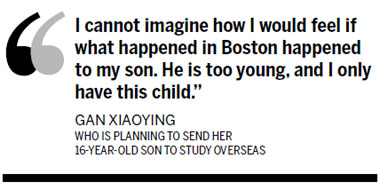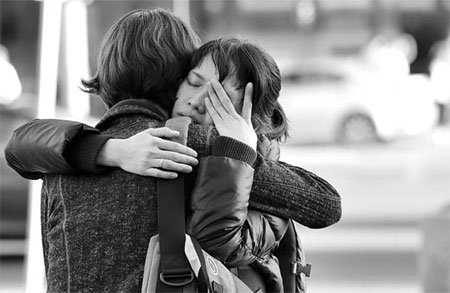Marathon blasts hurt US image as safe place to study
|
Boston University students hug each other and cry following a Wednesday service for the Chinese graduate student who was killed during the bomb explosions during the Boston Marathon at Marsh Plaza on the campus of Boston University in Boston. Wang Lei / Xinhua News Agency |

The death of the Chinese student in the Boston bombings presents a potential image nightmare for US higher education, which is determined to counter perceptions that the United States is unsafe.
The Chinese woman, who was studying for a master's degree in statistics at Boston University, was identified as one of the three dead in Monday's attack at the city's famed marathon, which also wounded about 180 people.
Gan Xiaoying, mother of a 16-year-old who had visited many schools on three continents as she planned for her son's study overseas, said the main reason she dropped the US from consideration, despite the quality of education there, was the safety concern.
"I cannot imagine how I would feel if what happened in Boston happened to my son.
"He is too young, and I only have this child," she said, adding that he may go to the US later for graduate school "when he is grown up enough to take serious care of himself".
Gan's son studies at an international school in Shenzhen, where he is preparing for examinations to enter British schools.
Violence is hardly unique to the US, and few expect a sudden exodus of foreign students, who often have already spent tens of thousands of dollars on their US education or consider US universities to be exceptional.
When students decide whether to study abroad and weigh factors such as quality and cost, attacks such as those in Boston - or gun massacres at Virginia Tech in 2007 and Connecticut's Sandy Hook Elementary School in December - can only be downsides.
US Secretary of State John Kerry, speaking before the Boston attacks as US lawmakers considered a failed bill on gun purchases, said on a trip to Japan that he heard some students were afraid to study in the US.
"One of the responses I got from our officials from conversations with parents here is that they're actually scared. They think they're not safe in the United States, and so they don't come," Kerry told CNN.
The number of Japanese students heading to the US has fallen since the early 1990s due to factors that likely also include an aging population and a stagnant economy.
China is the top source of international students, so any trend reversal would have a major effect. Foreign students contribute $22.7 billion to the US economy with tuition and other expenses, according to the Commerce Department.
Three countries alone - China, India and South Korea - contribute about half of the foreign students in the United States, according to the Institute of International Education, a nonprofit group that supports exchanges.
Gary Rhodes, director of the Center for Global Education at the University of California at Los Angeles, said that safety was always a factor when choosing a university, including for US citizens.
"Most students - whether on campus or abroad, or international students - have a very positive experience. But whether it's in the US or other parts of the world, there are safety challenges that happen, and anytime they do, it's very tragic," he said.
Zhang Han, co-founder and executive vice-president of Quakers Education, a private education company focusing on study-abroad consulting, said the violence in Boston was not the norm in the US.
"I haven't heard any complaints from my clients about the safety issue since the explosions. The US, all in all, is a safe and highly developed country with great education resources."
The United States remains by far the biggest host of international students, taking in nearly 765,000 in 2011 - nearly twice as many as second-placed Britain, according to a US government-backed survey.
AFP - China Daily
(China Daily 04/19/2013 page11)















